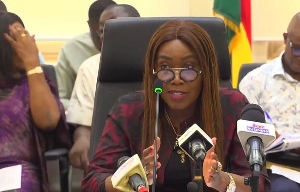Regional News of Tuesday, 14 August 2012
Source: GNA
CICOL organizes orientation workshop for members in Accra
The Civil Society Coalition on Lands (CICOL) has organized an orientation workshop to sensitize and enlighten members on the Second Ghana Land Administration Project (LAP 2), under the Ministry of Lands and Natural Resources scheduled for July 2011 to June 2016.
The workshop was to develop greater private sector participation, as well as build better customer awareness and ensure effective project management.
Mrs. Sarah Antwi-Boasiako, Social Development and Gender Specialist, National Project Coordinating Unit of the Ghana Land Administration Project, said the LAP 2 aimed at consolidating and strengthening the country's land administration and management systems for efficient and transparent land delivery.
She said the project focused on the completion of outstanding policy, legal and institutional reforms, removing business bottlenecks in land service delivery and promoting transparency and addressing the numerous land administration management challenges in Ghana.
Mrs. Antwi-Boasiako noted that the project considered the involvement of CICOL as critical in achieving its objectives, saying it would engage them in areas of comparative advantage such as community outreach and mobilization and public education monitoring and evaluation.
“In order to ensure that CICOL plays its role effectively, LAP 2 would address the capacity development needs of participating Civil Society Organizations (CSOs)”.
Mrs. Lillian Bruce, Coordinator of CICOL said LAP 2 which was the second phase of the Land Administration Project, was the latest of the long term 15 to 25 years reforms in the land sector and a continuation of phase one.
She said LAP 2 intended to consolidate the gains made under the first phase by deepening reforms, enabling the land sector agencies to be more responsive to clients, cutting down the cost and time of doing business and providing an enabling environment to reflect the objectives of an efficient and transparent service delivery.
"The components of LAP 2 include strengthening the policy, legal and regulatory framework for land administration, decentralizing and improving business and service delivery processes, improved maps and spatial data for land administration, develop human resource and project management," she said.
Mrs. Bruce noted that the project would focus on four regions across the country, namely Greater Accra Region for the purpose of reducing land litigation and enhancing security of investment, Western Region due to the discovery of oil in the area and the likelihood of emergence of land dispute.
The rest are the Northern Region for its poverty focus and a high potential for large scale commercial agriculture that could engender land disputes, and the Ashanti Region on the basis of having a fairly cohesive single traditional authority, making it an advantageous area for scaling up the development of traditional land administration systems.
She said the project would be beneficial to landowners and traditional authorities, small-scale farmers, tenant farmers, leaseholders all including women, land sector agencies, metropolitan, municipal and district Assemblies, the Judiciary, estate developers and service providers.
The Civil Society Coalition on Lands is a network of civil society organizations that advocates for equitable land tenure practices, policies and management in Ghana with 65 member organizations and individuals throughout the 10 Regions of the country with diverse expertise in land economy, community development, gender and women’s rights, land governance, environment, forestry, agriculture and mining.
With its existence since November 2007, CICOL has been working as a strong and vibrant civil society movement with the aim of influencing fair and just land reform and administration in the country.
The organization researches into land policies, practices, usage, administration and management, informs, educates and sensitizes communities, organizations and agencies on critical land issues and lobbies governments, communities, organizations and other development partners, to ensure equity and fairness in access and control of land for production and other uses.










